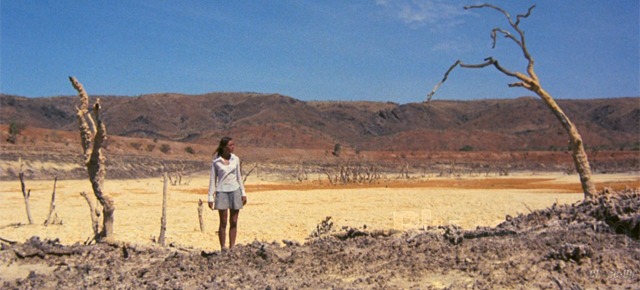Potemkine Films continues its work around the filmmaker Nicolas Roeg this year since after Don’t look back, it’s the turn of walkabout to be released on blu-ray and DVD. Available since April 19, let’s take a look at the film, Nicolas Roeg’s first solo production dating from 1971. Indeed, when Roeg decided to go to Australia to adapt a novel by James Vance Marshall (which is not other than the pseudonym of Donald G. Payne), he only performed Performance with the painter Donald Cammell and owes his reputation above all to his technical versatility in British cinema, the man being in turn editor, cameraman and above all director of photography. walkabout marks a milestone in his career, and what a milestone! The filmmaker showing himself to be perfectly at ease, drawing the beginnings of an exciting filmography.
walkabout starts from a simple premise: abandoned in the Australian bush by their father who committed suicide, a teenager and her younger brother try to survive as best they can. They end up crossing paths with a young aborigine in the middle of walkabout, a ritual initiation wandering away the young people from the tribe for several months once they have reached a certain age. The three companions in misfortune will thus help each other despite their language barrier, but this complicity which is created at the time can only be ephemeral, the young Westerners wishing to return home…

There are many things to say about this film, each sequence of which can be dissected to draw an interesting premise. There is indeed behind the narrative simplicity of the scenario a real substantive work carried out by Roeg and his screenwriter Edward Bond and above all a pure formal work where staging and editing combine in an astonishing way (a trademark of the filmmaker ) in order to offer an unprecedented cinematic experience. We already note the importance of walkabout in the history of Australian cinema since it is the first film to give such an important place to an Aboriginal character, a figure hitherto confined to eternal racist clichés and often embodied by white actors with painted faces. Here the character is central and embodied by the young David Gulpilil (who will become an eminent figurehead of Aboriginal cinema until his death in 2021) and the very title of the film refers to an Aboriginal practice. However, the film is not pro-aboriginal for all that and Nicolas Roeg is careful not to express the slightest Manichean point of view on his characters. Indeed, the white settlers are certainly shown as heartless, violent and lustful beings, but the aborigines are portrayed as incapable of adapting to the changes occurring in their country, thus causing their loss.
With Walkabout, Nicolas Roeg only insists on the idea of a cruel world and an eternal incommunicability between beings, either because they do not want it, or because they cannot, that the gap between them is too big to cross anyway. He thus condemns the sketch of a relationship between the young teenager (Jenny Agutter, superb) and the aboriginal (a taboo also for the time, that of daring to suggest, through the eroticism of naked bodies, any kind of relationship interracial) to be nothing more than a sketch since even reunited in a similar journey, the two find themselves unable to understand each other and therefore to push their relationship further. This same idea of an initiatory journey is thus far from idyllic. The filmmaker certainly shows the existence of a piece of Paradise lost (with the central scene where the three characters bathe naked in a sort of still wild Eden which man has not touched), a Paradise to cling to once you grow up, but the story is above all that of a loss of innocence, close to fairy tales, walkabout constantly showing the hostility of the Australian bush, filming the animals that inhabit it on numerous occasions. Animals that devour each other, that are hunted, the whole film constantly refers to a certain notion of savagery, clearly insisting on the cruelty of such a territory, a territory which only refers to the generalized cruelty of the world even when this- it hides behind walls and concrete.

Deliberately cryptic, walkabout asks more questions than answers. Why does the father want to kill his children in the beginning before committing suicide? What do these French sentences heard and read at the beginning and end of the film mean ( “place your bets, gentlemen and ladies, please” in opening and a card indicating “Nothing is going well” at the end of the credits)? Nicolas Roeg is careful not to answer them, thus opening up several avenues of reflection on his film, whose mysteries ultimately have something natural about them, corresponding perfectly to the mystical nature of the film. walkabout of the title. walkabout thus proves to be both sublime and macabre (the music of John Barry, using the didgeridoo adds a fatal atmosphere), a cruel reflection on the violence of a world that is not getting better. Its atmosphere remains unique in the history of cinema, making the journey not very accessible for everyone but nevertheless devilishly exciting for whoever wants to get carried away, marking in particular the birth of a great filmmaker to rediscover.
Similar items
We would like to give thanks to the writer of this post for this awesome content
Mystical and fascinating wandering –
You can find our social media accounts as well as other related pageshttps://nimblespirit.com/related-pages/

